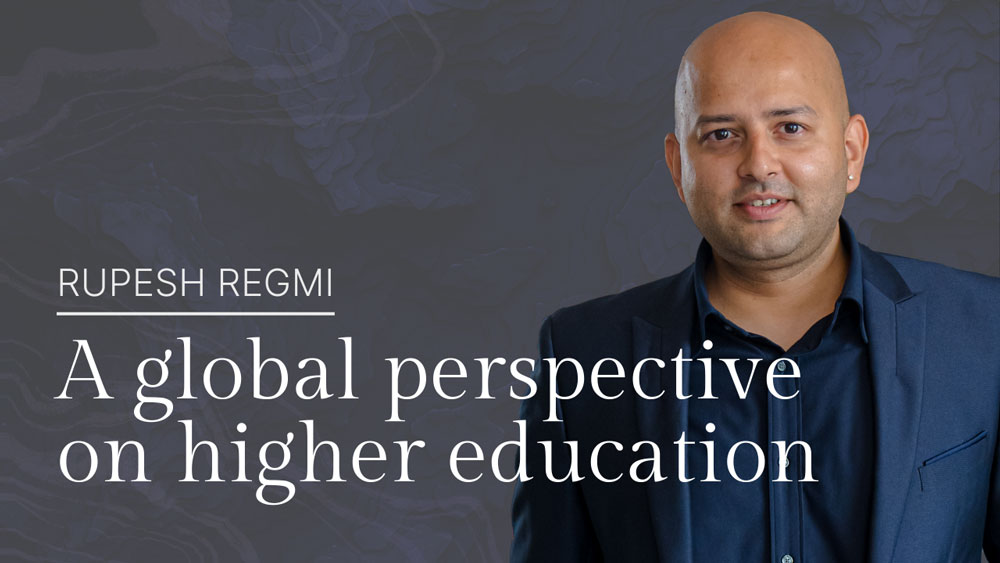Gillian Moindi
9
min read
A Global Inclusion Strategy: Empowering Millions with Access to Higher Education in China
Pupesh Regmi
Co-Founder | WiseAdmit
Key Highlights
When you google 'The real cost of studying in a world-class university', the numbers range from $10,000 to a whopping $80,000. However, Rupesh Regmi bears knowledge tucked away in the shadows; China's elite universities offer undergraduate and master's degrees for as low as $2000 to $4500.
Starting in a governmental public school in Nepal, Rupesh defied the odds and charted a remarkable journey to a highly-ranked institution in China. He pursued and earned not just a master's but also a PhD while balancing two jobs.
Having personally felt the transformative power of studying in China, he emphasizes the importance of universal higher learning to achieve expert knowledge and meaningful connections.
Right after high school, Rupesh desired to pursue aeronautical engineering. It was not available in his home country, Nepal, forcing him to apply to universities in the US. He only got an opportunity to study computer science. Surprisingly, China's Nanjing University of Aerospace and Aeronautics, a highly ranked institution for Aerospace Engineering globally, had a vacant position for him.
"The tuition fee was 90 percent less than in the US. It was a no-brainer for me." — Rupesh
Now, Rupesh Regmi is the co-founder of WiseAdmit, a firm offering access to quality and affordable higher education in China. Students from underprivileged communities can study bachelor's or master's degrees in different fields, including art, medicine, engineering, humanities, business studies, or only Chinese or Korean language.
The Birth of a Business Idea
At only 17 years old, Rupesh embarked on his undergraduate journey. In the third year, he realized a shift from Aerospace Engineering, as he was more compelled to help students from Nepal explore better education opportunities in China.
He envisioned the untapped potential of capable individuals back home in Nepal who might not be aware of the available opportunities. Facilitating the process could make a significant difference in empowering these individuals and addressing the typical challenges poor people face with accessing higher education in the region.
In South Asia, including Nepal and sub-Saharan Africa, the majority of poor young people face significant barriers to higher education, while their wealthier counterparts are 3 to 5 times more likely to obtain university degrees (Ilie & Rose, 2018).
Despite the urgency, Rupesh couldn't initiate the process right away. Recognizing the need for adequate entrepreneurship knowledge and connections with universities, he knew he had to first gather the necessary resources to make a meaningful impact.
Upon finishing his bachelor's, he pursued and completed a master's program before venturing into a Ph.D. in Management Science and Engineering. Concurrently, he was working two jobs at the university.
In the course of his Ph.D., Rupesh strongly desired more exposure. With a friend working as a researcher at a university in Busan, South Korea, he delighted at the idea of pursuing an exchange program at the institution. He set out on a new adventure to Korea for his doctoral visit from 2018 to 2019.
Korea offered a distinctly bustling experience despite its two-hour proximity to China by flight. He encountered a new culture and language while still pursuing Chinese and Mandarin. There were enticing opportunities and personal interests awaiting exploration, but he ended up devoting the majority of his time to work in the laboratory.
In Pursuit of Entrepreneurial Knowledge
In January 2020, he finally got a one-month holiday. He saw it as a chance to return to Nepal shortly to visit his family. Unfortunately, COVID-19 disrupted his schedule. Nepal immediately initiated an early lockdown to buy time to prepare a response to the pandemic (Pandey et al., 2022). Reflecting on it now, it served as inspiration for him to forge connections and bridge the gap between Eastern and Western education.
"I decided that, 'I have learned everything from the East. I now want to experience the West as well." — Rupesh
Shortly after, his wife was going to the University of British Columbia (UBC) for accounting studies. Rupesh seized the opportunity and relocated to Vancouver. His primary occupation in the city was networking. He fortuitously encountered a mentor who was immediately fascinated by his entrepreneurial idea and invited him to UBC's Entrepreneurship Program for a formal presentation. Ultimately, he secured acceptance.
The program doubled as a startup incubation center. Its 12-week curriculum was attended by individuals at various entrepreneurship stages—whether considering entry or aiming to commercialize existing solutions. Its primary focus was to impart skills in different entrepreneurial strategies, such as customer discovery and presentation.
"I got the chance to talk to a lot of mentors and meet industry leaders from different dimensions." — Rupesh
Formation of WiseAdmit: Affordable Higher Education in China
Armed with entrepreneurship insights and a strong conviction in the transformative power of education from his experience, Rupesh identified specific pain points to tackle. One significant issue was the millions of capable students globally unable to access quality education at reputable universities due to financial constraints.
There was also a notable lack of awareness in underserved regions, such as South Asia and sub-Saharan Africa, of the opportunities in top-tier faculties and premium student experiences abroad. Rupesh aspired to serve as a bridge, raising awareness and empowering students to realize their full potential.
After years of envisioning, he, eventually, established WiseAdmit with the mission of making education readily available. Utilizing the global connection facilitated by advanced technology, the company's vision is to provide an opportunity to access world-class education to as many capable young people.
"Education should not be a privilege. It's a fundamental human right. In the West, education is expensive because everything is expensive over there." — Rupesh
WiseAdmit Changing the Lives of Young People
One of the individuals benefiting from WiseAdmit is Rupesh's cousin. Hailing from a rural area in the far west of Nepal, attending a reputable university in the U.S. was not a viable option, considering the financial constraints of her family.
Seeing this, Rupesh advised her to pursue a bachelor's degree in China. She decided to major in Electronics and Automation and, upon completion, got a job in a Chinese-invested hydropower company in Nepal. Notably, she has now gained admission to Tsinghua University, a prestigious institution in China often regarded as an equivalent of Harvard.
"She hasn't even graduated, and she's got 20-plus job offerings. In a matter of six years, her life has completely changed." — Rupesh
In another case, WiseAdmit recently set a solid footing in Kinshasa, Democratic Republic of Congo (DRC). The higher education in the country is of notably poor quality. The University of Kinshasa which holds the top position within the country, for instance, is ranked 2,855th in the global 2023 ratings (EduRank, 2023).
After Rupesh engaged with several students, he helped them secure an invaluable opportunity to attend highly esteemed Chinese universities. Each of them received a full tuition fee waiver for their first year.
"Their parents were super delighted. I can't wait to see the transformation the four years' experience will bring into them." — Rupesh
Why Study in China?
China provides world-class education, offering students a distinct advantage. It is renowned for its extensive scholarship offerings to international students, ensuring that higher education in the country remains highly cost-effective. The scholarships cover tuition fees and accommodation and sometimes even include stipends to cater for other expenses.
In addition, Rupesh relates the pursuit of higher education in China to two notable perspectives in life. Firstly, it involves acquiring mastery in specific domains. In his own experience, obtaining two engineering degrees equipped him with proficient problem-solving skills to navigate the current business world.
"Another is the student experience. My goodness! I had the greatest time of my life during my four years of college in China. I wish I could go back." — Rupesh
The crucial aspect of networking and the opportunity to establish meaningful connections is highly undervalued in most places. Rupesh emphasizes the importance of university life to the valuable relationships he cultivated. Notably, individuals who were in the same classes as him in China now hold positions at prominent global companies such as Airbus and Boeing.
Western Universities Are Great, but Not Affordable
Chinese universities are steadily advancing toward top positions. The ranking system originated from the Western region, explaining why they have traditionally led the way. However, universities in the East are actively working to comprehend and navigate the intricacies of these systems.
"If you look at the subject-wise ranking of the universities we partner with, the research output rivals any Western university. Whether we like it or not, the future of STEM education is slowly tilting towards the East." — Rupesh
Universities in the East are leading the forefront in cutting-edge research and technological advancements that significantly benefit humankind. Rupesh mentions key players such as Jiangnan University in Wuxi, Nanjing University of Aeronautics and Astronautics, Wuhan University, China Pharmaceutical University, and China University of Mining and Technology.
In 2022, China's number of world-class universities increased. Seven new institutions among the existing 140 were selected to receive special funding to support teaching and research in specific subjects. The offer also positioned them to compete with major global universities (Sharma, 2022).
Facing a Factor Typical of Any Organization - Challenges
Despite these advances in China, WiseAdmit still encounters challenges. It is competing with the allure of Western universities. Many students are primarily familiar with higher education in the U.S., Canada, the UK, and Australia, with the last three ranking below the global average university student satisfaction this year (Mitchell, 2023).
"They find themselves rushing from class to the part-time job and back to class. — Rupesh
Independently developing a market also poses another major obstacle for WiseAdmit. It requires proactive efforts to raise awareness that top-notch education and valuable industry experience can be obtained in China and can serve as a stepping stone for future opportunities in Canada, the U.S., the UK, and Australia.
Rupesh acknowledges the emotional roller coaster that comes with being involved in any startup, including tech. To him, problem-solving is instinctive. He leverages the skills honed during his studies daily at WiseAdmit. He takes advantage of social media and student success stories to showcase the achievements of current students in China to build up credibility.
What's Cooking at WiseAdmit?
Rupesh plans to return to Nepal. He capitalizes on its proximity to China and the substantial Chinese investment in Nepalese industries like airlines, hydropower, and tourism. He aims to leverage the good relationship Nepal has with China for the benefit of education.
Rupesh advocates for the concept of students going to China, transferring knowledge, and bringing back technology to Nepal. An increasing number of Chinese scholars studying Nepalese affairs reflects China's heightened interest in enhancing its relationship with Nepal (Sharma, 2018).
"It is an exciting time for Nepal. A lot of tech companies are booming. Entrepreneurs are ditching outsourcing tech services and coming up with their products. This is a great sign!" — Rupesh
However, in the southern region, the two Indian states bordering Nepal are presently the poorest in India, a concern that Rupesh is actively addressing. Despite challenges, his unwavering focus remains on the goal and mission that education should transcend politics and economics.
Limited financial resources prevent higher education institutions in South Asia from collaborating. Despite the increasing student enrollment, their counterparts in Europe and East Asia continue to grow in synergy (World Bank, 2023).
What to Expect: A Global Education Milestone
WiseAdmit's objective stands to understand students' pain points while embracing local cultures. Rupesh invites students to explore opportunities on WiseAdmit's website, which fosters language learning and cultural exchange.
"If anyone wants to understand more about China, you can quickly assess yourselves on our website within three minutes and find the best-fit programs and scholarships. Feel free to send me a message." — Rupesh
Through inclusivity, technology, and cultural exchange, WiseAdmit offers education access to millions of children from economically disadvantaged backgrounds. Recognizing the direct link between literacy and poverty, the initiative not only empowers individuals to achieve financial stability but also addresses the broader societal implications. Communities with increased access to quality studies witness lower crime rates, improved overall health, and heightened civic involvement.
We hope you found this blog post informative and enjoyable. Ready to take your knowledge to the next level?
Subscribe to our newsletter for regular updates delivered directly to your inbox. Stay connected with us on social for industry insights and company updates.
Join our global community of industry leaders and innovative thinkers today.
References
EduRank. (2023, July 18). University of Kinshasa [2023 rankings by topic]. EduRank.org - Discover university rankings by location. https://edurank.org/uni/university-of-kinshasa/rankings/
Ilie, S., & Rose, P. (2018). Who benefits from public spending on higher education in South Asia and sub-Saharan Africa?. Compare: A Journal of Comparative and International Education, 48(4), 630-647.
Mitchell, N. (2023, October 19). UK, Australia, Canada: Student satisfaction below average. University World News. https://www.universityworldnews.com/post.php?story=20231019163915490
Pandey, B. D., Ngwe Tun, M. M., Pandey, K., Dumre, S. P., Nwe, K. M., Shah, Y., ... & Morita, K. (2022). How an outbreak of COVID-19 circulated widely in Nepal: a chronological analysis of the national response to an unprecedented pandemic. Life, 12(7), 1087.
Sharma, B. P. (2018). China-Nepal relations: A cooperative partnership in slow motion. China Quarterly of International Strategic Studies, 4(03), 439-455.
Sharma, Y. (2022, February 17). More universities become “world class” to meet China ambitions. University World News. https://www.universityworldnews.com/post.php?story=20220217082128415
World Bank. (2023, July 20). Leveling Up: Advancing Higher Education Cooperation in South Asia OneSouth. Asia, Higher Education, regional cooperation. https://www.worldbank.org/en/events/2023/07/12/leveling-up-advancing-higher-education-cooperation-in-south-asia



